Exactly How to Construct an Effective Group of Remote Professionals
In today's increasingly electronic landscape, the capacity to develop a successful team of remote specialists is crucial for companies intending to flourish. It is the subtler aspects-- like supporting a natural business culture and advertising constant knowing-- that can truly establish a remote group apart.
Define Clear Objectives and Expectations
Frequently developing clear goals and expectations is crucial for the success of a remote group (Remote Professionals). Without these elements, staff member may experience complication regarding their functions, obligations, and the general objectives of the task. This uncertainty can result in lowered efficiency, misaligned efforts, and ultimately, task failure
To specify clear goals, it is essential to utilize the SMART requirements-- Particular, Quantifiable, Attainable, Pertinent, and Time-bound. This technique guarantees that each objective is well-defined and can be properly interacted to all staff member. Furthermore, it is very important to line up individual purposes with the overarching vision of the organization, fostering a feeling of function and commitment amongst employee.

Foster Effective Interaction

Routine check-ins and team meetings can help maintain a strong communication flow, allowing members to share progression updates and talk about any kind of barricades they might run into. It is additionally vital to identify that various people might have varying communication styles. Understanding and accommodating these distinctions can bring about even more significant interactions and a much more cohesive team dynamic.
In addition, quality is crucial in all kinds of interaction, whether composed or verbal. When needed, encourage team participants to verbalize their concepts succinctly and to look for explanation. This strategy makes certain and minimizes misunderstandings that everybody is on the very same page. By focusing on efficient interaction, remote teams can improve performance, enhance connections, and create an extra comprehensive work setting, eventually resulting in greater success in attaining common objectives.

Use the Right Tools
To sustain effective interaction within a remote team, it is essential to use the right tools that assist in collaboration and enhance workflows. The option of tools can substantially impact efficiency, ensuring that group members remain connected and involved despite geographical ranges.
Begin by implementing job monitoring software application, such as Trello or Asana, to arrange tasks, set target dates, and track progress. This promotes liability and provides exposure right into each member's contributions. Furthermore, interaction platforms like Slack or Microsoft Teams provide instantaneous messaging capabilities, allowing real-time conversations and fast decision-making.
Video clip conferencing tools, such as Zoom or Google Meet, are necessary for in person interactions, which help develop relationship and reinforce relationships among employee. In addition, document sharing and storage options like Google Drive or Dropbox make certain that important files are available and editable by all employee, advertising collaboration on projects.
Including these devices effectively creates an environment where remote professionals can thrive. By selecting the right technology, organizations can enhance interaction, boost task monitoring, and inevitably accomplish their goals much more effectively.
Build a Strong Company Society
Creating a solid firm society within a remote team is vital for promoting engagement and loyalty amongst staff members. A well-defined culture provides a feeling of belonging and shared objective, which is vital when team members are dispersed throughout various places. To cultivate this culture, leaders ought to establish clear worths and assumptions that resonate with employees, ensuring that every person comprehends the mission and vision of the company.
Routine communication is vital in enhancing this culture. Utilizing video clip telephone calls, team conferences, and informal check-ins can assist advertise and preserve connections openness. Furthermore, commemorating accomplishments, both big and little, enhances a culture of recognition and appreciation.
Urging team cooperation with digital platforms not just improves performance however also promotes interpersonal connections - Remote Professionals. Organizing virtual team-building tasks can further enhance bonds among employee, making them feel extra integrated right into the company
Finally, it is very important to pay attention to employee comments and adjust as needed. By revealing that their voices issue, leaders can develop trust fund and loyalty, eventually developing a flourishing remote job environment where workers really feel valued and engaged.
Motivate Continual Learning and Advancement
A solid company culture prepares for encouraging continuous discovering and click now development within a remote team. By promoting a setting that values growth, organizations can equip staff members to enhance their skills, adjust to brand-new difficulties, and eventually contribute more effectively to team purposes.
To advertise constant learning, think about applying regular training sessions, workshops, and webinars that line up with both private profession objectives and business requirements. Leverage innovation to assist in accessibility to e-learning systems, ensuring that resources are readily available for remote team members.
Motivate understanding sharing by developing mentorship programs and producing online forums for staff members to trade understandings and ideal techniques. Compensating and identifying staff member that proactively take part in discovering efforts strengthens the significance of advancement and inspires others to adhere to match.
In addition, performing normal comments sessions can assist determine skill gaps and areas for renovation, enabling tailored advancement plans. By prioritizing constant learning and development, remote groups can grow a culture of adaptability, resilience, and development, which are vital for navigating the intricacies these days's company like it landscape.
Verdict
In conclusion, the facility of an effective remote team depends upon the combination of clear objectives, efficient visit this website communication, ideal tools, a durable business culture, and constant knowing possibilities. By lining up individual payments with organizational goals and fostering a setting of openness and cooperation, remote professionals can grow. Remote Professionals. The application of these approaches not only boosts group cohesion yet additionally drives inspiration, inevitably leading to enhanced performance and success in a remote functioning landscape
It is the subtler facets-- like supporting a natural firm culture and promoting constant discovering-- that can genuinely set a remote team apart.Efficient communication is the cornerstone of a growing remote group. By prioritizing efficient interaction, remote teams can boost efficiency, enhance relationships, and produce an extra inclusive work setting, ultimately leading to higher success in attaining common goals.
Producing a solid company culture within a remote team is crucial for fostering interaction and commitment amongst employees.In final thought, the facility of an effective remote group hinges on the integration of clear goals, efficient interaction, ideal tools, a robust business culture, and constant understanding opportunities.